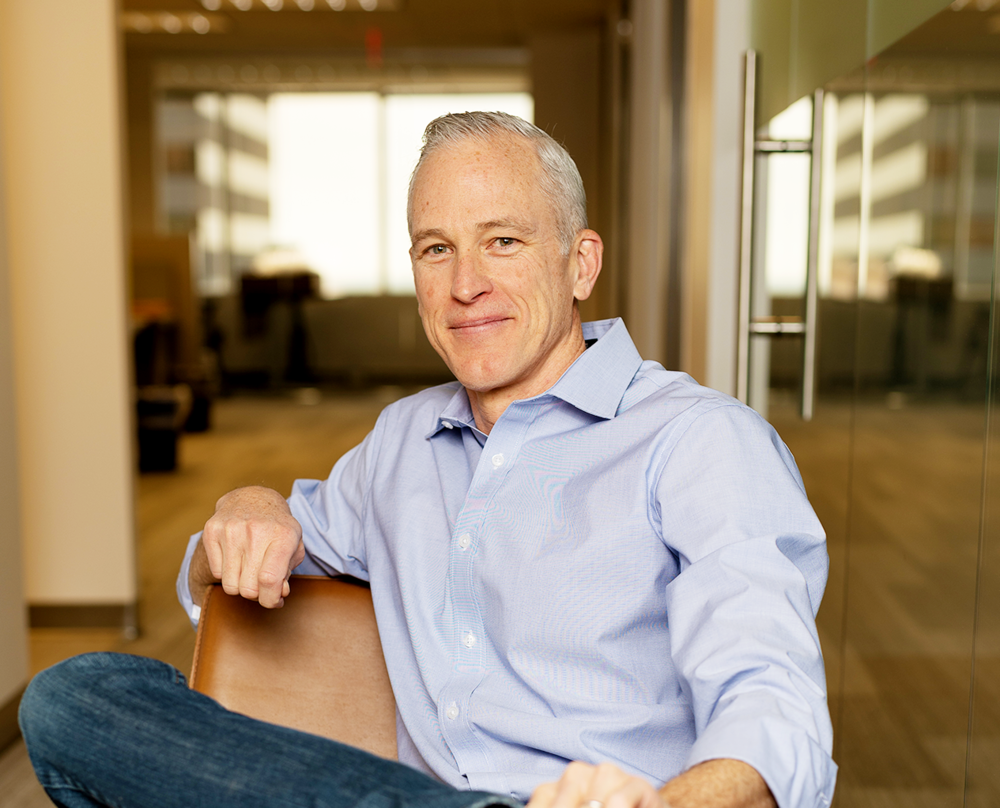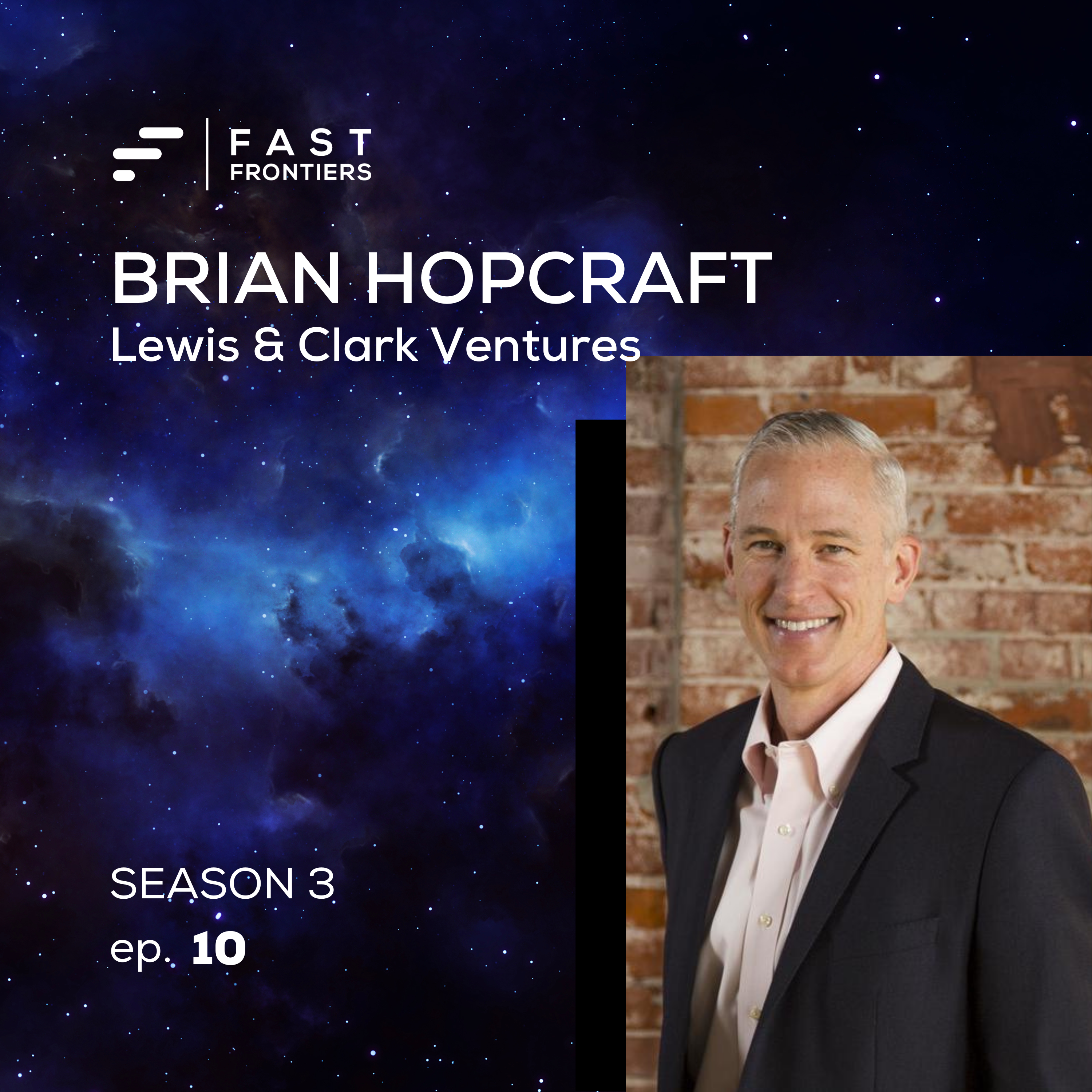S3 Ep 10. Brian Hopcraft: Lewis & Clark Ventures
- 0.5
- 1
- 1.25
- 1.5
- 1.75
- 2
Tim Schigel: Okay, welcome to Fast Frontiers. I am your host, Tim Schigel, managing partner of Refinery Ventures. In this episode, we're talking with Brian Hopcraft, managing director at Lewis & Clark ventures in St. Louis. An early stage venture firm managed by former founders and operators, investing in late C through series B companies between the coasts. In this episode, we're going to dive into the origin story of Lewis & Clark ventures and their family of funds. We're also going to talk about the value of having venture investors with operating experience, that can help entrepreneurs understand the importance of raising the right amount of capital and from the right firms. The biggest theme or so, what I hope you take away from this conversation, is the advice that Brian has learned and gives to many entrepreneurs. Which is to ask for help. There are so many people out there willing to help you. You just need to reach out to them. And second dream big. Push aside any imposter complex and take the leap to start your company. It's going to be the best thing you'll ever do in your career. Please enjoy my conversation with Brian Hopcraft. Hello, Brian. Good to have you on a Fast Frontiers.
Brian Hopcraft: Thanks Tim. It's great to be here. I'm a big fan. This is a great platform and excited to be part of it.
Tim Schigel: We don't get to catch up often enough, so I'm glad at least we get to catch up now on this episode.
Brian Hopcraft: That's right. Looking forward to it.
Tim Schigel: So a lot of great things happening with you, some recent announcements, which we'll get to in terms of your continued growth of your fund, but first, I always love starting at the beginning. So tell me more about the origin story of Lewis & Clark ventures.
Brian Hopcraft: Yeah, that's great. You're probably similar when you talk to entrepreneurs and you first get to know them. I always love to hear the story of, "How did you get the idea? How did you get started?" So I'm happy to share that today. Yeah, I guess, prior to being in venture, I've been an entrepreneur of early stage tech companies. I was lucky enough to join a software company. A friend who worked in 1992 or something like that, and really fell in love with the industry and never left. The origins of Lewis & Clark is I had met my founding co-partner, Tom Ellman. Gosh, it was about 11 years ago. He recruited me to St. Louis to be CEO of a software company that he was an owner of. Our relationship went from there and really been working with him since then. But about six years into that relationship, he had come off a big exit with a company that I'd worked for two called answers in St. Louis, which is a great success story. Exited for just under a billion dollars to a big PE fund. And we started thinking about what's next and really, I think, as any good entrepreneur and he's been very entrepreneurial, he's been a serial entrepreneur or an investor, his whole career. And as any good entrepreneur, you think of problems or opportunities. And the problem we kept seeing throughout our careers and throughout investing and being involved with early stage companies was there wasn't enough capital in the middle of the country. Something Tim, you're very familiar with. You're helping solve as well. And we thought that the most impact we could have, and it would be at the A stage. So we said, "Well, let's see if we can raise a fund focused on A stage investing." Really kind of early A, maybe late seed is how we think of it. And we set out then in 2015 to raise a fund. We ultimately had success raising that fund and started putting money to work right at the beginning of 2016. So it was really based off of seeing the opportunity, doing some research and understanding why there really isn't, of the 1900 VC firms. So few of them are focused in the middle of the country. Yeah. We knew how many great entrepreneurs are here. How many great companies are here. How many great ideas are waiting for funding here. And that was really to start of the fund.
Tim Schigel: I have to reveal my bias towards operators who get involved in venture and particularly in the Midwest, outside Silicon Valley, because you have to understand kind of how the game is played. But you learned both with the companies you were involved with before Lewis & Clark, that early stage, but also the private equity stage. What are some of the top things you learned from that experience?
Brian Hopcraft: Boy, how long do we have is maybe what I would ask. And I look back at the days of when I was an entrepreneur, I probably made every mistake in building and starting and growing a company you could make. Some of the ones that I think about quite often and give advice to entrepreneurs are, ask for help is one of them. If you're starting out,, I had to kind of figure it out on my own. And the reality is there are so many people out there willing to help you. Just reach out to them. And I was somewhat intimidated or for whatever reason. I just felt like, "Well, I've got to just do this on my own." And I think I probably did not. I certainly did not find enough people out there, but I found enough of them that helped me grow the company, certainly is one. And I think from where there's so many trying to think of a couple others that would be germane to the audience here. I think it's dream big. I remember having imposter complex, that I was starting this company. And I was like, "Who am I to start this company?" And through my process of fundraising, I had one meeting where I was meeting with the guy who used to run Burger King. And this was the CEO of Burger King or former CEO, and very easy guy to talk to. And he, in this conversation, started talking about how he had imposter complex. And this is somebody who had such a storied career and a great success. And he had great success as the CEO of Burger King. And I remember thinking, "You have imposter complex? I can't even believe I'm sitting here talking to you and that I even wanted to start this company." And I think it was acknowledging that we all have that fear. We have to get over it and learn to manage it and deal with it. And it really kind of never goes away in some ways. And so when I talked to people who have an idea about a company, it's like," Hey, take the leap. It's going to be the best thing you'll ever do in your career. You have no idea where it's going to go, how successful or not, but either way, it's going to be a pivotal moment in your life. Take the leap."
Tim Schigel: That is a very good one. I've been through that myself. And it ties back to the first one. And I remember when I've had those thoughts in the past, it's actually by reaching out and talking to other people and investors and you start getting feedback and saying, "Who am I?" On the other hand, I haven't talked to anybody who said, "Anybody has solved this problem." So if not me, who? That was the best part of emphasizing and encouraging me was, "Well, nobody else has had this, has had the solution for this."
Brian Hopcraft: Exactly. And so why not you? I think that's right. And everybody has to deal with their own insecurities and their fears that I think that's just one fear that as an entrepreneur, as you know, you don't know what obstacles you're going to find. But there will be obstacles. And you've got entrepreneurs that says, "I don't know what it's going to be, but when they happen, I'll deal with it. I'll figure it out. And we'll get past it some way or another." And I think that perseverance is probably another lesson where I look back at my company and there were so many things that happened. And then sometimes I just think about, "Gosh, I was not going to give up." And that got me through those really dark stages where, "How am I going to make payroll next Friday or whatever it might be?" And figure those things out. It manages to work itself out one way or another.
Tim Schigel: Which challenges do you think are specific or unique to your stage of investing that's series A or after the seed round?
Brian Hopcraft: Oh, that's an interesting one. Well, I think, going back to at the beginning of your question and your bias toward the investors with operating experience, I think we share that bias because we've been in that seat. And I think there's a mentality that is that perseverance and you're going to figure it out. And so I think when we're investing at BA stage companies have revenue, they have customers, it's early. And I think that the challenges are probably just keeping focused, persevering, leveraging your network, asking for advice. I think the best CEOs that we work with are upfronts and about the challenges. And they don't just try to sugarcoat everything.
Tim Schigel: What was different about the challenges when you got involved with private equity fund?
Brian Hopcraft: So through acquisitions, I found myself working with companies that were backed by Vista Equity Partners. And, I learned so much from them. The challenges are it's a very different world when you're a much later stage company. But I think what probably what I learned the most from Vista at least was they have standard operating procedures. So they have kind of loose plays for scenarios that happen on the field. Bit of a weak analogy there. And I think it was thinking through all the things that potentially can happen and how you're going to address those. So there's a planning element to it. There was some standard things that they felt any software as a service business needs to do regarding pricing, how you would implement a customer success program. things like that, that I took away and said, "Okay, this is really interesting to watch how a much bigger entity builds a company and takes them from that pretty later stage to a much further later stage, how you rationalize a bolt-on investments and how you think about talent." I think was an interesting one. They're always thinking two or three turns over the horizon as far as who you're going to need. When are you going to need to top grade. That focus on talent from the beginning was really interesting and certainly applies to venture as you know. When we invest, it's early and there's 10, 20 people in the company and the company looks very different a year or two down the line that talent and planning for talent and thinking about that is important.
Tim Schigel: Well, it seems like the early stages entrepreneurs think that the capital is the hardest part. and when you get to private equity stage, you'll realize capital's not our problem. It's talent. Talent is the constraining factor.
Brian Hopcraft: Sure is. Yeah, that's right. And so-
Tim Schigel: Does that help you? Do you find that that's helped you then to see what it feels like then, and then come back to the early stage and say, "Okay, I know what I need to aim for now."
Brian Hopcraft: Definitely. Because you know what? I think it helped me because I had a vision. I just intuitively then knew what a company looked like when it was 200 or 400 or 600 people versus the very early stages. And so how do you help the CEO and the management team when we invest build that foundation? Because what we found is, boy, when you get the right people in the right seats, things really start to take off so much more quickly. Then I can think of examples from our own portfolio where a great CEO that we work with was just resistant for the longest time to bring in a COO or somebody to really help them with the operations. And it was something that he wasn't in his wheelhouse, he wasn't a detailed person. That side of the house didn't excite him. And so by the time we finally found somebody who's just been quite a catalyst for us. It's been amazing because he's been able to grow because he's now focused doing things that he loves that are externally facing, less so on the internal stuff. So it just so many examples in our portfolio. And I imagine you've seen it as well when you get the right person in, it becomes quite an accelerator. And you have to think about that six months a year before that you're going to find that person and get them into that seat. So it's that really thinking about talent. And we ask the companies that we invest in, I'm sure you do as well when you're going through that process of getting to know them, I'm like, "Well, how are you thinking about what the team needs to look like a year from now after you've had your round. And you're starting to put that money to work. Maybe even two years from now." And it's really having the CEO be self- aware enough as well to know what do they like to do, where they want to focus on, what do they not like to do? Do they like the financial side of the business? Do they like the product side? Or are they more of a externally facing go-to-market sales related leader? Every leader is different. And I think he could slice that and create the organization many different ways, but being self-aware and understanding that well in advance is super helpful and will help your company scale.
Tim Schigel: So what advice would you give to entrepreneurs in terms of finding investors at that series A stage?
Brian Hopcraft: Well, let's see. Part of back to what I said, maybe earlier around never being afraid to just reach out to people. They can certainly try to do some research on the funds that have partners in those funds, that you think you might like to work with. Getting to know those folks or just understanding what are they known for? What do they specialize in? What are some of the companies they've backed? Do I know any of them? I think CEO's oftentimes probably don't do as much research maybe on the venture fund or the partners that'll be working with them. Again, you said a minute ago, it's like, "Hey, we've got the capital. Great. Now let's go." It's like, "Well, this is a relationship that's going to last years and years, and this is a very important relationship in the life of your company and for you, the CEO and the management team." So, spend the time to do all the diligence on the personnel side that we're doing on you, I think is one that I would say is the big thing that oftentimes companies don't do enough of.
Tim Schigel: Yeah. It's hard for some entrepreneurs to make that shift where they're asking, trying to raise money and think, "No, that money is another service provider."
Brian Hopcraft: That's right.
Tim Schigel: Really, if you can make that shift in your mind, then you start being a little more selective. Right.
Brian Hopcraft: Yeah, that's right. Exactly.
Tim Schigel: And when you're desperate for the money, it's hard to think that way sometimes.
Brian Hopcraft: That's right. If you're building an interesting company, you're going to have options and part of that option should be working with people that you really want to work with for the right reasons. That's right.
Tim Schigel: Right. So do you see differences in today's environment for entrepreneurs building companies versus 10 years ago or more, 2008 timeframe, et cetera. How would you compare and contrast that timeframe versus today's environment?
Brian Hopcraft: Sure. I think so much has happened clearly on the tech side with AWS and other tech components, I think it aids the middle of the country because it's just that much easier to build a software company. I think about the things we had to do when I started my company and that the server closet we had and the team that we had just for some of that stuff that you don't even have to worry about anymore. It's amazing. I think though, that the entrepreneurs today are smarter. There's so much content out there around. Gosh, you name every part of entrepreneurship, but I think there is so much more information online. So many more accelerators, incubators, groups. There's just so many more resources that I think enable folks to take that leap and then start the company probably because they're just smarter today. I think there can be downsides. I think in the middle of the country, some of the challenges, and maybe you see this too is, the size of rounds is getting bigger and bigger. And oftentimes I feel like, well, you want to raise a $10 million series A. I get it. I was in your shoes and boy, the more money, the better you might think. But I think it's working with the entrepreneur to really help them understand that you want to raise the right amount of capital. And you have to rationalize that. And because you can raise a big round doesn't mean that you should raise a big round. It'll be better for the entrepreneur over time if there's multiple funding rounds. And I think that there's a west coast mentality. If you look at the average numbers, you're comparing yourself mostly from the middle of the country to the coastal and I just don't think you need that as much capital. You want to build a business capital in a capital efficient way. And I think that that's a big lesson that I think entrepreneurs really need to understand.
Tim Schigel: Yeah. I've seen a lot of entrepreneurs come and ask me, "Hey, we're thinking about raising around. How much should we raise?" They don't understand how to evaluate it. It's just like you said, the more is better and that's not really true. And we're benefiting because the region is getting more mature companies and hopefully more people educated, but that's also a big reason for this podcast actually is to have these conversations, talk about some of these things to help entrepreneurs understand this. Of simple things. Kind of, "Hey, you should double your valuation every 12 to 18 months. And your typical dilution is going to be 20% to 30%." And if you understand those guidelines, it actually gets a lot simpler. But if you're a first time entrepreneur and you don't know that, you have no way points to figure out how to navigate it. Right?
Brian Hopcraft: That's right. Exactly. And so I think some of that is just sitting down and saying, "Let's walk you through how we think about how much money that you should be raising." And if you're going in the right direction and you're growing, as that you say, capital's going to follow growth and you're going to be able to raise capital. So if you're a successful, the capital will be there and you need to rely on your partners to help you raise that capital from the right people. That's part of what I think we do. And obviously you do is once you've got a portfolio company and they're looking for that next round of capital, and they're going to get it, you're going to make sure they get it.
Tim Schigel: And if you have the metrics back to the capital follows growth. If they have the metrics, that's easy, we can open the door and just say, "Hey, yes, I know this person, this person, this person. I can't make them invest, but I can help you at least ensure that you connect and your metrics will speak for themselves."
Brian Hopcraft: That's right. That's exactly right. So having them, walking them through how much we think they need and why there's always a bit of a fudge factor there, a bit of a we don't know for sure. It's somewhat art and science, so you can raise a little bit more. But I think getting away from the vanity of a bigger round, I think is important and it's a good exercise. And I think those are, those are great conversations to have because it builds the relationship. When we have those conversations, it' from a pure place of you as the entrepreneur don't want to be at the end of this and have a very small percentage of their company as well. We want you to do really well in this. That's part of the motivator of working with other younger entrepreneurs is boy, this is A, it's a lot of fun and B, I want to see you be successful because rising tide is going to lift all boats here. And then all of the country.
Tim Schigel: You don't want a big preference stack hanging over your head.
Brian Hopcraft: That's right.
Tim Schigel: That you're never going to be able to get out of. So how has your portfolio thrived and survived over the past year with COVID?
Brian Hopcraft: Yeah. It's been quite a year, hasn't it? Well, I think like everybody, there was that moment of, oh gosh, I can say exactly a year ago when, what's happening, who knows how long this is going to last, the market was going the wrong direction. And we, like you and other venture folks, were very hands-on with their portfolio companies. I think we were probably lucky that some of our portfolio companies had a strong balance sheet going into that. So that was good. They'd raised around, they had a year and a half plus of capital. Awesome. And then I think certain businesses of ours bested the COVID tailwind. Some businesses just for whatever reason, I could think of a couple in our portfolio, one of our healthcare companies really, we found out they're more mission critical. We weren't sure if it was a mission critical solution. Well, it sure is. And it turns out that's a wonderful, wonderful thing. But we have some other companies that have really been challenged by it for a variety of reasons. And so I think it's across the board generally been positive for the portfolio. I think also our companies have gotten, certainly the ones we had invested in earlier in our investment life cycle, we're further along. And so they could weather anything that came their way. So generally we've been pretty, pretty positive and pretty excited about where they've all ended up.
Tim Schigel: That's good news. So your first few funds, you had a couple of different funds. You want to kind of just talk through that?
Brian Hopcraft: Sure. Yeah, absolutely. So very much a family of funds at Lewis & Clark. So on the venture side, we have our first venture fund is about $80 million. We had two $25 million we call sidecar funds as part of that. One was dedicated to digital healthcare. One was dedicated to plant sciences and agriculture. And our second fund, which we've just opened. So our ventures to fund, we just opened at $51 million. We will be fundraising and. we will continue to get back to same size as where our first fund was, but we also have a sister fund. And I don't know if I mentioned this to you, Tim, prior. It's a growth stage fund in focused on food and agriculture. And this is a later stage growth focused on food, supply chain, et cetera. Ingredients in agriculture. They're about a $250 million fund. So we are very different LPs, different teams, but we share some back office. And so if you think of assets under management, gosh, I think we're probably closer to 400, 450, all in all. So it's a great groups to be part of.
Tim Schigel: So how did that come about?
Brian Hopcraft: It's a good story. So one of the things that's exciting about St. Louis is it's right in the middle of the agricultural world. I think 500 mile circumference around St. Louis is something like 70% of the US farm land. So we're in a great spot. There's also a world renowned and world leading research institution in St. Louis called the Donald Danforth Plant Science Center, which is just doing tremendous work. So there really are more plant scientists in St. Louis per capita than anywhere else in the globe, I think, from some of the things that I've seen. So that's exciting. So St. Louis was always an innovation hub for ag tech. We've got a number of plant size and ag tech companies in our fund one portfolio, Benson hill being one of those that's been in the news, and this has done quite well. So we were exposed to that. And then we had a peer of mine that joined our firm that had a deep background in agriculture, plant science and food, and thought, this is a big enough opportunity that we should make this a separate fund and off we went.
Tim Schigel: That's cool. There's any other news items from your portfolio you can share that are kind of recent?
Brian Hopcraft: So recent news that we're excited about is a Beam Dental, which is a Columbus Ohio based portfolio company of ours. Raised a big round recently. So we're super excited about that. At least an $80 million growth round. So they've continued to just do a great job. Love the leadership there with Fro and the team that he's put together. It's a good success story, in Ohio and Columbus and one that we're very proud to be part of. So that's some exciting news.
Tim Schigel: Yeah. I talked to Fro, so he's going to be in this season of podcasts. He's learned a lot and doing a great job from Louisville, Kentucky originally. So that is-
Brian Hopcraft: That's great.
Tim Schigel: Congratulations on that. That's a good story.
Brian Hopcraft: Oh, it's a great story. Yeah. And great leadership there, visionary founder. I really look forward to listening to that podcast.
Tim Schigel: So if you would project that, put on your future Fast Frontier cap and project out, what's the next 10 or 15 years look like in the state of tech and venture capital in the Midwest?
Brian Hopcraft: Oh boy. Okay. Love to do that. The premise of our fund, as I mentioned before was really not enough capital in the middle of the country, and I think that's changing, but I think it's changing slowly. And I think it's going to take awhile for the middle of the country to gain parity with the coast. But we'll have more and more venture funds. You see this happening, Lewis & Clark didn't exist six years ago. Now we've got multiple family of funds in different segments and we think we're helping make a difference. And I think you're going to see more and more of that. what you see and what you've been involved with in Cincinnati. It's so fun to see these ecosystems evolve and when they have a success story, a big exit and how that starts to turn the flywheel just a little bit faster. And so I think you're going to see that continuing in cities like Indianapolis, where it's happening, Columbus, Cincinnati, St. Louis, where you can just see the momentum is increasing. And I think that's going to continue. I really am such a big believer in that innovation is anywhere and everywhere. I don't know if you ever heard the story of sliced bread, but it's an interesting one. And I think it tells a story of the middle of the country. It's like, where do you think slice bread was invented? And when? And it's a fascinating story, because you might think, Well, it might be even Rome. Because people have been eating bread forever. They had knives back then. How could it not be that far back? Well, that wasn't it. Maybe it was in Paris in 1852. Because of the thousands of bakeries and their strong culinary tradition?" That wasn't it. It was actually Chillicothe, Missouri. On 1928. I made the date wrong, but it's a small town in Missouri. I live in Missouri. I don't even know where Chillicothe is. I had to look it up. It's a very small city and it's just like, why did it happen there? It's such a great example of well, innovation is everywhere and that's not going to change. So I think you're just going to see more and more of these companies in the middle of the country. There's so many factors that are leading into that. Certainly the being able to work from anywhere, the ability to start a company so much more efficiently and effectively, I think the ecosystems having matured, I really just am bullish and long on the middle of the country here is ability to create great companies. That'll be a significant for all of us.
Tim Schigel: Yeah. Thank you. You mentioned before about entrepreneurs dreaming big. Typically you think people move to Silicon Valley and they're dreaming big, and we want them to dream big in St. Louis and Cincinnati and Michigan and other places where the opportunity is just as big, if not bigger. And they have a strategic advantage by being there because they're not competing for all that talent that they have in Silicon Valley. And you have more talent that understands those various verticals just like you mentioned, ag tech or Beam Dental in Columbus would drive a lot of FinTech and insurance capabilities there that don't exist in Silicon Valley.
Brian Hopcraft: That's right.
Tim Schigel: So every company is now a tech company. Every industry, you have to think like a tech company. But if you combine that domain expertise with the application of technology, now you're onto something.
Brian Hopcraft: Yeah. I think that's a great point. I think in the coast, not always the case, they tend to be experts in the technology. But the domain expertise is oftentimes, here in the middle of the country, like you just mentioned. All that domain expertise in Columbus, Ohio, combine that with all the other technology components that you've got Beam Dental, which is quite a success so far.
Tim Schigel: And sometimes that's an advantage because you can look at a problem with fresh eyes and reinvent it. But I think we're starting to see more and more of that here in the Midwest when I encourage it.
Brian Hopcraft: That's right. Completely agree.
Tim Schigel: Awesome. Well, Brian, thanks for being on Fast Frontiers. It was great to catch up.
Brian Hopcraft: No, I've really enjoyed it. Delighted to be part of it. And yeah. Thanks for having me
Tim Schigel: Wish you much success, but fun too. And then funds 3 and 4 and we'll check in again soon.
Brian Hopcraft: Awesome. Thank you Tim. Take care.
Tim Schigel: Thanks for listening to Fast Frontiers. If you like our show and want to know more, check out our website, fastfrontiers.com. If you enjoyed this episode, please share it with others and give us a rating and review on your favorite podcast platform. Join us next week when we bring you my conversation with Kimberly Reed, former chairman of the board of directors, president, and CEO at the Export Import Bank of the United States. The Fast Frontiers podcast is brought to you by Refinery Ventures. Our producer is Abby Fittes. Audio engineering by Astronomic Audio. Marketing, content and social media support from Content Callout. And our podcast platform is Casted.
DESCRIPTION
In this episode, we're talking with Brian Hopcraft, Managing Director at Lewis & Clark ventures in St. Louis. An early stage venture firm managed by former founders and operators, investing in late seed through series B companies between the coasts. We're going to dive into the origin story of Lewis & Clark, and talk about the value of having venture investors with operating experience, that can help entrepreneurs understand the importance of raising the right amount of capital and from the right firms.
Today's Host

Tim Schigel
Today's Guests







